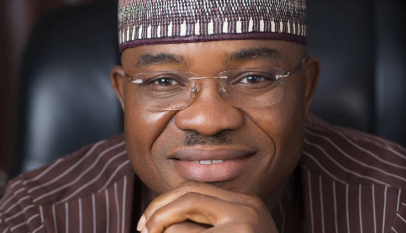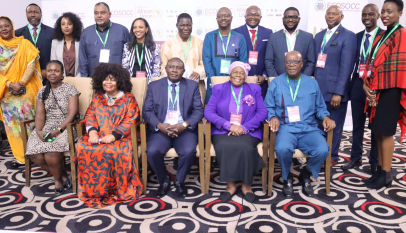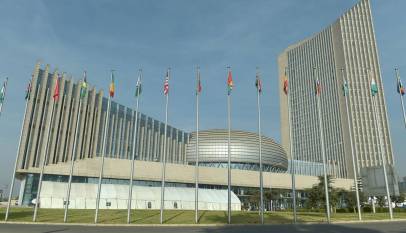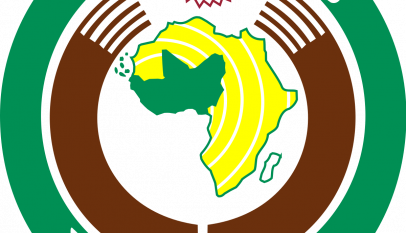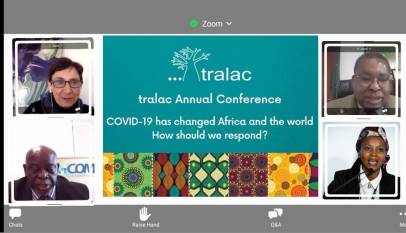INDEPTH | Africa Industrialization Day 2020: Towards inclusive, sustainable industrialization in the AfCFTA era
The Africa Industrialization Week 2020 (AIW 2020) climaxed with a high-level session commemorating the African Industrialization Day 2020 (AID 2020), where President Mahamadou Issoufou of the Republic of Niger cum AU’s President Champion of the African Continental Free Trade Area (AfCFTA) was honoured for his transformational leadership of the AfCFTA process.

Since the proclamation of the Africa Industrialization Day (AID) at the 25th Extra-Ordinary Session of the Assembly of Heads of State and Government of the Organization of African Unity (OAU), in 1989, the Day’s commemoration has grown into the most high profile platform for reflection on Africa’s industrialization drive. This was what merited the upgrade of AID’s commemoration into a week-long event by the African Union Commission in 2018.
The 3rd commemoration of AID as weeklong event, which held last week came at the backdrop of the shattering impact of the Covid-19 pandemic on Africa’s economy, as well as in the context of the forthcoming liberalization of the African market through the commencement of trading activities under the African Continental Free Trade Area (AfCFTA).
The week-long commemoration saw deliberations on key topics pertinent to the continent’s inclusive and sustainable industrialization. Pertinent issues discussed during the course of AIW2020 include Africa’s need for renewable energy and circular economy; Place of quality infrastructure in Africa’s trade, industrialization and economic policies; Place of micro, small and medium enterprises (MSMEs) sector as a game changer in Africa’s industrialization process, amongst many other crucial topics.
It was against this backdrop that the AID 2020 commemoration was held November 20, with the aim of reaffirming the political will and commitment of African leaders towards driving Africa’s transformative industrialization process, as a pathway to addressing the continent’s myriad development challenges.
Inclusive, sustainable industrialization key to Africa’s development, says AU trade and industry commissioner
In his welcoming address at the high-level event, Amb Albert Muchanga, the Commissioner for Trade and Industry at the AU Commission, said the COVID-19 pandemic which had disrupted global value chains and subsequently crippled economies including leading to the postponement of the commencement of trading under the AfCFTA. As a result, Muchanga said this year’s Africa Industrialization Week commemoration signified the imperative for Africa to leverage the AfCFTA to adapt, recover and thrive.
“Against this background, Africa must adapt by using the AfCFTA to develop regional value and supply chains. The pharmaceutical sector has, during the COVID-19 Pandemic demonstrated the possibility of this transformation, with positive results in the manufacture and supply of PPE,” he said. “We must also move towards digital transformation. The Fourth Industrial Revolution offers the best opportunity for Africa to leap-frog her sustainable development. The young population that the continent has is attracted to the emerging digital economy and what we need is to create the right environment for the emergence of youth driven start-ups anchored on innovation.”
Muchanga, who congratulated President Issoufou of Niger for his transformational leadership of the AfCFTA process, evidenced by the award bestowed upon him by the organisers of AIW 2020, called for increased collaboration between the African Union and the continent’s private sector, as shown in the cardinal step already taken to foster such a collaboration through the establishment of the African Business Council, as part of the architecture of the AfCFTA.
“We need the investments of the private sector to transform Africa from a commodity dependent economy to a diversified economy that is globally competitive. In this respect, I would like to thank all members of the private sector in this audience and urge you to build partnerships with African governments and academia, to promote research and development as well as industrial design which are critical to attainment of competitiveness through which ownership of the resultant technologies will be assured; and, in the process, assist us in building technological capabilities.”
Muchanga, who emphasized the importance of inclusive industrialization in achieving sustainable development, said the AU had requested UNIDO to carry out a regional value chain mapping for Africa, to allow the continent to gain insights on what each African country could produce and export to the rest of the continent, either as final or intermediate goods. This, he said, will help the AU promote specialization and investment promotion, thereby creating an environment for win-win outcomes at national levels under the AfCFTA regime.
“If I am re-elected as Commissioner, [one of my major goals] will be to work with African Heads of State and Government to secure agreement for some of them to become African Union Leaders and Champions on the Digital Economy; Inclusive Sustainable Industrialization; Mobilization of Investments across Africa; and, among others, Sustainable Tourism. One of the Leaders I will approach is His Excellency the President of Madagascar who is with us in this Session,” vowed Muchanga who is currently seeking reelection for a second term as commissioner at the AU Commission.
Africa must align the AfCFTA with its industrialization drive, says ITC executive director
In her remarks, Ms Pamela Coke-Hamilton, executive director of the International Trade Centre (ITC), called for a realistic and accurate diagnosis of where the world stands after the Covid-19 pandemic disruptions, urging all relevant institutions to work with the AU towards providing the true picture of how the pandemic had affected African economies. “This will help us develop an appropriate response and recovery strategy for impact, bearing in mind that one-size-fits-all approach will not work, for each country in Africa has its own specificity,” she said.
Coke-Hamilton said aligning the AfCFTA to Africa’s industrialization drive was crucial, since the AfCFTA is a blueprint for facilitating the process of structured transformation of intra-African trade, as well as serving as an insurance policy against future crisis. She consequently emphasized the need for inclusivity in Africa’s industrialization drive by putting micro, small and medium enterprises (MSMEs) at the heart of the continental recovery and industrialization policies, with a special attention to women and youth-owned-and-managed-enterprises, who are worst hit by the pandemic.
“ITC has already began to work with the AU Commission and the AfCFTA Secretariat to support greater linkages between the regional private sector and regional women business associations with policymakers. We are currently developing a series of actions that we hope to resonate with our youth community throughout the continent to spur their engagement with the AfCFTA. To a new initiative at AFREXIMBANK, we are piloting a how-to-export training program aiming to increase the awareness and opportunities of engaging in cross-border trade which the AfCFTA will provide.”
The ITC chief bemoaned Africa’s current huge importation of food despite being the world’s main exporter of agricultural commodities and thus urged for agro-industrialization on the continent. She said even as the world was experiencing varied challenges to do with ecological disruptions and climate change, the globe was also witnessing an increased adoption of greener energy, efficient technology as well as a shift in consumer preferences for greater organic products and services.
“Africa is extremely well positioned to take advantages of this change, from leap-frogging technologies to greening the AfCFTA, to ensure its supportive of the development and importation of green technology, to supporting organic production and certification, Africa can take full advantage of investing in its own green deal going forward, by positioning its agribusiness industry as a key driver of growth,” she said.
Coke-Hamilton said Africa’s post-pandemic recovery period industrialization strategy must ensure situate MSMEs, women and youth, green recovery, digital penetration and value-addition at the centre of its focus. “The AfCFTA is a vehicle to promote this; the AfCFTA represents a monumental step towards realizing Africa’s full potentials, it provides a foundation to transform the continent to greater self-sufficiency and ITC including through its One Trade Africa Programme, will be there to support and walk alongside you,” she averred.
We need an African Development Finance Institutions Industrialization Working Group, says AFREXIMBANK president
While also speaking at the high-level session, Mr Benedict Oramah, the President of the Africa Export-Import Bank said the advent of the AfCFTA and its overwhelming endorsement across the continent affords Africa the opportunity to transform itself using its abundant natural resources and large, youthful population.
Oramah wondered why decades after their independence, African countries still export cocoa beans to import chocolate, raw hides to import shoes and bags, as well as crude oil to import or refined petroleum. However, he believes the AfCFTA’s market of 1.2 billion people and cumulative GDP of USD3.2 billion would provide a pathway for Africa’s industrialization, as well as building a continent that is self-reliant and productively integrated into the global value chain.
“Africa’s annual imports are in the order of about $600 billion, of which 70% more than are manufactured goods. About $190 billion of this manufactured imports have low to medium technology contents, and another $60 billion are labour and resource intensive. What this means is that two-thirds of the manufactured imports into Africa amounting to about $250 billion do not require sophisticated technologies and are labour and resource intensive. These are resources that abound in Africa. There’s therefore no reason Africa shouldn’t be creative in a $250 billion manufacturing industry, which can increase manufacturing value-added services significantly from its current low level.”
Thus, Oramah urged African governments to create the right policy environment for corporates to take advantage of the continent’s cheap and abundant low to semi-skilled labour; ensure an intellectual property right regime that encourages innovation and creativity; provide industrial infrastructure such as energy; and ultimately work with African development finance institutions to support industrial development programmes. In the same vein, Oramah urged African corporates to begin to look beyond their domestic markets, by expanding their operations to other countries so as to benefit from the regional manufacturing market of $250 billion.
“We should consider creating, under the auspices of the AU or AfDB, an African Development Finance Institutions Industrialization Working Group to lead and coordinate resource mobilization for the development of the continent’s industrial sector. As Africa’s development finance institutions, we cannot afford to be working in silos when there is so much work to be done. The AfDB’s Africa Investment Forum provides an excellent platform to attract FDIs into Africa’s manufacturing sector.
“UNECA and UNIDO’s thought leadership must be harnessed in mapping regional value chains and understanding market opportunities. At AFREXIMBANK, we are leaving no stone unturned to push ahead Africa’s industrial development efforts. We have created a $1 billion fund for export development in Africa, with a seed investment commitment of $325 million, which we hope will help to address the equity and long-term funding gap and help attract FDI into Africa, by reducing political risks through complementing and supplementing existing sources of patient capital,” he said.
Multi-stakeholder partnership key to Africa’s inclusive, sustainable industrialization, says UNIDO DG
Mr Li Young, Director General of United Nations Industrial Development Organization (UNIDO), in his speech at the high level session, recognized the challenges the Covid-19 pandemic had exposed African economies to and thus called on African countries to explore and implement measures that would stimulate faster and durable economic recovery, whilst paying due attention towards building resilience. He described the AfCFTA as offering a concrete avenue for African economies to not only recover from the socioeconomic impact of the Covid-19 pandemic but also thrive.
“However, for the AfCFTA to be successful, deliberate efforts to address structural transformation and industrialization are required. In this regard, policies should also be geared towards strengthening links between trades and industrial strategies and policies, developing industrial infrastructure, promoting regional value chains, upgrading digital capacities, enhancing productive and trade capacities, promoting green industry and circular economies, and developing and upgrading industrial skills,” he said.
The UNIDO chief said the establishment of multi-stakeholder partnerships and effective coordination mechanisms, as exemplified in UNIDO’s Programme for Country Partnership (PCP), which had been successfully implemented in Ethiopia, Morocco and Senegal, was crucial for attaining inclusive and sustainable industrial development in Africa.
“In this regard, I am pleased to point out that UNIDO’s Programme for Country Partnership (PCP) has proved to be very effective. It brings various stakeholders, including governments, development partners, UN agencies, development finance institutions and the private sector together. The PCP approach help mobilize funds and leverage large-scale additional investments for infrastructure, industry and innovation, as well as knowledge expertise and technology to support sectors with high growth potential in order to achieve a greater development impact,” he said.
In his concluding remarks, Mr Young reiterated UNIDO’s readiness to support AU Member States in their quest to accelerate the productive transformation of the African continent. “We will use every opportunity to support the realization of aspirations and goals outlined in the AU 2063 Agenda and the 2030 Agenda for Sustainable Development,” he assured.
Africa must exploit its agricultural resources for agro-industrialization, says UNECA executive secretary
In her remarks, Ms Vera Songwe, executive secretary of the United Nations Economic Commission for Africa (UNECA), emphasised the need for Africa to exploit its agricultural resources such as cattle population, by exploring and boosting its industrial milk production capabilities.
She said the dairy industry offers a great opportunity to boost the continent’s economy, citing India and the United States of America as examples of countries doing well in industrial milk production and consequently contributing about 22% to total global milk production. Although Africa is home to 10 percent of the world’s cattle population, the continent contributes less than 3 percent of global milk production and spends more than $500 million every year to import milk products.
Songwe said for Africa to boost its milk production and harness its huge but largely untapped milk potential, the continent must ensure adequate nutrition to its cattle population, accelerate harmonization of policies; and implement technology and digitization in the process. “This will create more employment opportunities, reduce cost of production and encourage youths with technological skills to work in the area,” said Songwe.
AfCFTA opportunity to diversify African economies away from commodity dependency, say AIW 2020 organisers
In the joint statement released on AID 2020, organisers of the commemoration, namely AU Commission, UNIDO, UNECA, AUDA-NEPAD and Afrochampions Initiative, said the AfCFTA presents African countries with the opportunity to structurally transform and diversify their economies away from commodity dependency towards increased intra-African trade in manufactured goods, which has the potential to facilitate quicker recoveries of African economies, most of whom are currently undergoing a recession triggered by the COVID-19 Pandemic.
Amongst others, the joint statement urged African leaders to advance AfCFTA and Africa industrialization side-by-side through deliberate efforts aimed at realizing the mutually reinforcing interdependence between the two, which will create the required condition for the realization of the objective of Agenda 2063 as well as boosting the continent’s capacity to deliver on the targets and aspiration of Agenda 2030 and the Third Industrial Development Decade of Africa (IDDA3).
“Without a transition from commodities to value addition and economic diversification, including traceable services, as well as embracing the rapidly evolving technologies, African economies will have limited room to grow national income, or expand fiscal space. Thus, the greatest prospect for Africa’s accelerated pace to industrialize, rest on the development of regional value chains, to inform viable cross-border investment decisions. That way, the pace and impact of regional, and continental integration can become a reality, strengthening the continent’s SMEs, and large-scale enterprises’ capacities to plug into global value chain production systems,” the statement added.
“The AUC, AUDA-NEPAD, UNECA, AfroChampions Initiatives and UNIDO are, therefore, through the organization of this Africa Industrialization Day and Week, with one voice, are calling on all stakeholders to upscale support for the sustainable and inclusive industrialization of the continent, as we enter the AfCFTA Era. It is laudable that the AU HoS/G passed a Resolution to host the Summit on Africa Industrialization and Economic Diversification in 2020, reinforcing the industry and trade nexus, a key link towards maximizing the potential of the AfCFTA. Thus, the Africa Industrialization Week is a key building block politically towards setting the tone for the Summit rescheduled to next year,” concludes the statement.
I dedicate my award to African youths waiting for the AfCFTA, says President Issoufou
During the AID 2020 high-level commemoration event, Nigerien President cum President Champion of the AfCFTA Mahamadou Issoufou, was honoured for his outstanding contributions as the AU’s leader for the implementation of the African Continental Free Trade Area (AfCFTA); the African Union Heads of States Champions are chosen by their peers to lead the process across selected key thematic areas with huge potential for driving the continent’s growth and sustainable development.
In his acceptance speech after receiving the award from former Nigerian President Olusegun Obasanjo cum patron of the AfroChampions Initiative, President Issoufou said he had dedicated the award to African youths whom, he said, were impatiently awaiting the immense benefits to be brought to them by the liberalization of trade on the African continent, through the AfCFTA.
President Issoufou it was only through inclusive and sustainable industrialization that Africa could become the world’s next major manufacturing hub. “Inclusiveness simply means that we should not exclude anyone. No one should be left behind. Industrialization is at the service of everyone, it must benefit everyone. Industrialization must be carried out for the benefit of all including future generations, hence the link with sustainability which means conservation of nature.”
The Nigerien President decried the initial import Substitution Industrialization (ISI) programs adopted by most African countries during the post-independence period adding that the countries had failed to industrialize because their individual national markets were too small and fragmented. “Africa is indeed too balkanized with 55 states and nearly 84,000 km of borders, all obstacles that limit exchanges between the citizens of the continent. From the above stems the importance of the African Continental Free Trade Area through which we create a vast market of 1.3 billion people where goods and services can be traded freely.”
President Issoufou described the harmonization of policies, rules, regulations and standards as key to Africa’s industrialization adding that ongoing efforts to develop an African policy on quality industrial infrastructure would put the continent in a better position to adopt the “Made in Africa” standard, the implementation of which would remove technical barriers to trade in the African Continental Free Trade Area and consequently bring the continent closer to achieving a single market.
“Mechanization, mass production, information and communication technologies, automation and digitization are among the technological processes associated with industrialization. The Fourth Industrial Revolution in which we currently find ourselves brings new demands for innovation and sustainability. Africa must capitalize on this revolution and the next one already on the horizon, the Fifth Industrial Revolution, which will be characterized by increased interaction between machines and humans and will also focus on creating a better world,” said President Issoufou.
The AfCFTA champion said for the continent to attain inclusive sustainable development, it had to leverage its abundant natural resources, ranging from minerals to water and arable land; industrialize agriculture through mechanization and the application of smart technologies; foster public-private partnership in the development of transport, communication and distribution networks along the entire length and breadth of the continent; as well as incorporating the micro, small and medium enterprises.
“I also call on all Member States of the African Union to sign and ratify the Agreement establishing the AfCFTA so that, thanks to the single market thus created, there would be increased investments essential for job creation and faster post COVID-19 remission. Hoping that the present edition of Africa Industrialization Week has been able to achieve all of its objectives and offering my congratulations to the African Union Commission and other partners, I reiterate my solemn appeal to the Secretary General of United Nations for the organization of a special summit on the industrialization of Africa,” he concluded.
AIW 2020 sought to reinforce the industry-trade nexus in the context of the business opportunities presented by the forthcoming commencement of trade under the Africa Continental Free Trade Area (AfCFTA). As Africa anxiously awaits the first day of free trade under the AfCFTA, January 1, 2021, the successful hosting of the 2020 Africa Industrialization Week (AIW 2020), under the theme: “Inclusive and Sustainable Industrialisation in the AfCFTA Era,” had reinforced the inescapability of ensuring AfCFTA’s implementation goes side-by-side with Africa’s industrialization drive.


